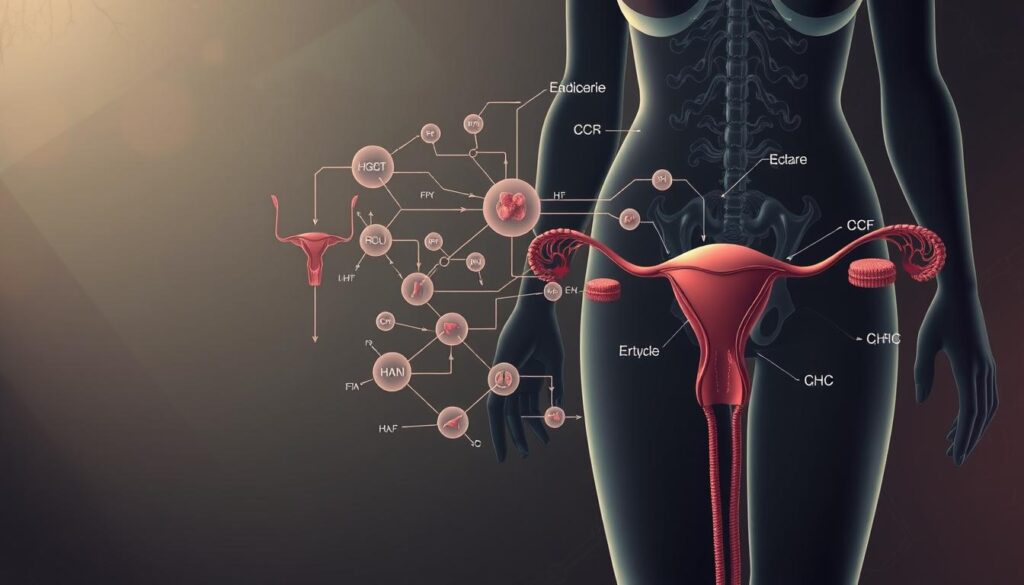Did you know that millions of women worldwide suffer from hormonal imbalances, leading to a range of symptoms from mood swings to more severe health issues? Estrogen regulation is crucial for overall well-being, and achieving hormone balance can significantly improve quality of life.
Fortunately, there are several natural ways to balance estrogen levels. By incorporating simple dietary changes, lifestyle adjustments, and stress management techniques, individuals can take the first steps towards achieving hormonal balance. This guide will explore various estrogen-regulating tips to help you regain control over your hormonal health.
Key Takeaways
- Understanding the importance of estrogen regulation for overall health.
- Identifying natural methods to achieve hormone balance.
- Implementing dietary changes to support estrogen balance.
- Utilizing lifestyle adjustments for hormonal well-being.
- Managing stress to regulate estrogen levels.
Understanding Estrogen’s Role in Your Health
Estrogen is a vital hormone that influences numerous aspects of health. It plays a significant role in reproductive and sexual health, but its impact extends beyond these areas.
How Estrogen Functions in the Body
Estrogen functions by regulating various bodily processes. It is produced primarily in the ovaries in women and in smaller amounts in the testes in men, as well as in other tissues. Estrogen receptors are found throughout the body, influencing bone density, cardiovascular health, and even brain function.
Recognizing Signs of Estrogen Imbalance
Estrogen imbalance can manifest in different ways. Recognizing the signs is crucial for timely intervention.
Symptoms of High Estrogen
High estrogen levels can lead to symptoms such as weight gain, mood swings, and heavy menstrual bleeding. These symptoms can significantly impact quality of life.
Symptoms of Low Estrogen
Conversely, low estrogen levels can cause hot flashes, vaginal dryness, and irregular periods. These symptoms are common during menopause but can also occur in younger women.
Common Causes of Hormonal Disruption
Several factors can disrupt hormonal balance, including lifestyle factors, environmental exposures, and certain medical conditions. Understanding these causes can help in managing estrogen levels effectively.
| Cause | Description | Impact on Estrogen |
|---|---|---|
| Lifestyle Factors | Diet, stress, and exercise habits | Can lead to imbalance |
| Environmental Exposures | Exposure to endocrine disruptors | Mimics or blocks estrogen |
| Medical Conditions | Certain health conditions | Affects estrogen production |

Natural Ways to Balance Estrogen Levels Through Diet
Dietary adjustments play a crucial role in balancing estrogen, offering a natural pathway to hormonal harmony. By making informed food choices, individuals can significantly influence their estrogen levels and overall health.
Incorporate Cruciferous Vegetables
Cruciferous vegetables, such as broccoli, cauliflower, and kale, are rich in compounds that support estrogen balance. These vegetables contain sulforaphane, which aids in detoxifying the body and promoting healthy estrogen metabolism. Including a variety of cruciferous vegetables in your diet can be a simple yet effective way to support hormonal health.
Add Fiber-Rich Foods to Support Estrogen Metabolism
Fiber-rich foods, including whole grains, legumes, and vegetables, play a crucial role in estrogen balance by aiding in the excretion of excess estrogen. A high-fiber diet supports healthy digestion and can help regulate estrogen levels. Examples of fiber-rich foods include oats, beans, and leafy greens.
Include Phytoestrogen Sources Strategically
Phytoestrogens are plant-based compounds that can mimic or modulate estrogen in the body. Foods rich in phytoestrogens, such as soy products, flaxseeds, and sesame seeds, can be beneficial when consumed in moderation. These foods can help balance estrogen levels, but it’s essential to consume them as part of a varied diet.
Foods to Limit for Hormonal Health
Certain foods can disrupt hormonal balance and should be limited or avoided. These include processed foods, added sugars, and excessive alcohol consumption.
Reducing Processed Foods and Added Sugars
Processed foods and added sugars can lead to insulin resistance and inflammation, both of which can negatively impact estrogen balance. Opting for whole, nutrient-dense foods can help mitigate these risks.
Moderating Alcohol Consumption
Excessive alcohol consumption can impair liver function, which is crucial for estrogen metabolism. Moderating alcohol intake can support liver health and, by extension, estrogen balance.
Sample Meal Plan for Estrogen Balance
A sample meal plan that incorporates the dietary recommendations for estrogen balance could include:
| Meal | Foods |
|---|---|
| Breakfast | Oatmeal with flaxseeds and berries |
| Lunch | Grilled chicken with roasted broccoli and quinoa |
| Dinner | Baked salmon with sautéed kale and brown rice |
| Snacks | Carrot sticks with hummus, apple slices |
By incorporating these dietary recommendations and being mindful of foods to limit, individuals can take a proactive approach to balancing their estrogen levels and supporting overall health.
Lifestyle Modifications for Healthy Estrogen Regulation
A well-balanced lifestyle is essential for maintaining healthy estrogen levels and preventing imbalance. By incorporating specific lifestyle modifications, individuals can significantly impact their estrogen regulation and overall health.
Optimize Your Exercise Routine
Regular exercise is a crucial component of estrogen balance. Different types of exercise offer unique benefits that can help modulate estrogen levels.
Strength Training Benefits
Strength training can help improve muscle mass and bone density, which are important for overall hormonal balance. Incorporating strength training exercises at least twice a week can be beneficial.
Cardiovascular Exercise Recommendations
Cardiovascular exercises, such as brisk walking, cycling, or swimming, can help improve heart health and support estrogen regulation. Aim for at least 150 minutes of moderate-intensity cardio per week.
| Exercise Type | Frequency | Benefits |
|---|---|---|
| Strength Training | 2-3 times/week | Improves muscle mass, bone density |
| Cardiovascular Exercise | 150 minutes/week | Enhances heart health, supports estrogen regulation |
Implement Stress Reduction Techniques
Chronic stress can negatively impact estrogen levels. Implementing stress reduction techniques can help mitigate this effect.
Mindfulness and Meditation Practices
Practicing mindfulness and meditation can help reduce stress and promote hormonal balance. Regular practice, even just a few minutes a day, can be beneficial.
Breathing Exercises for Hormone Balance
Breathing exercises can also help reduce stress and support estrogen regulation. Techniques such as diaphragmatic breathing can be particularly effective.
Improve Sleep Quality for Hormonal Health
Good sleep is essential for hormonal balance, including estrogen regulation. Improving sleep quality can involve establishing a consistent sleep schedule, creating a relaxing bedtime routine, and optimizing the sleep environment.
Reduce Exposure to Environmental Estrogens
Environmental estrogens, also known as xenoestrogens, can disrupt hormonal balance. Reducing exposure involves choosing personal care products and plastics that are free from endocrine-disrupting chemicals.
By implementing these lifestyle modifications, individuals can take a proactive approach to optimizing their estrogen levels and supporting overall health.
Supplements and Natural Remedies for Estrogen Support
In addition to dietary changes and lifestyle modifications, certain supplements and natural remedies can play a crucial role in supporting estrogen balance. While these supplements can be beneficial, it’s essential to approach their use with a comprehensive understanding of their effects on hormonal health.
Herbs That Help Modulate Estrogen Levels
Various herbs have been traditionally used to support hormonal balance. These botanicals can offer a natural approach to modulating estrogen levels.
Adaptogenic Herbs for Hormone Balance
Adaptogenic herbs like ashwagandha and maca are known for their ability to help the body adapt to stress, potentially supporting hormone balance. These herbs may help regulate cortisol levels, which can indirectly influence estrogen balance.
Traditional Estrogen-Regulating Botanicals
Botanicals such as black cohosh and red clover have been used in traditional medicine to support women’s health and may help in regulating estrogen levels. These herbs are often used in conjunction with other therapies to support hormonal balance.
Essential Nutrients for Hormone Metabolism
Nutrition plays a critical role in hormone health, and certain nutrients are particularly important for estrogen metabolism.
B Vitamins and Hormone Health
B vitamins, especially folate and vitamin B6, are crucial for hormone production and regulation. They support the liver’s ability to metabolize estrogen, helping maintain a healthy balance.
Minerals That Support Estrogen Balance
Magnesium and zinc are minerals that play significant roles in hormone production and regulation. Magnesium can help alleviate symptoms associated with estrogen imbalance, while zinc supports the body’s natural hormone production processes.
Working With Healthcare Providers
When considering supplements or natural remedies for estrogen support, it’s crucial to work closely with healthcare providers. They can help determine the best course of action based on individual health needs and ensure safe integration with any existing treatments.
Conclusion: Creating Your Personalized Estrogen Balance Plan
Achieving hormone balance and estrogen regulation requires a comprehensive approach that incorporates dietary changes, lifestyle modifications, and targeted supplements or natural remedies. By understanding the role of estrogen in your health and recognizing the signs of imbalance, you can take the first steps towards creating a personalized plan.
Start by incorporating cruciferous vegetables and fiber-rich foods into your diet to support estrogen metabolism. Limit your exposure to environmental estrogens and optimize your exercise routine to help regulate hormone balance. Consider adding herbs and essential nutrients that support estrogen regulation, and work with a healthcare provider to ensure a safe and effective approach.
By taking a holistic approach to hormone balance and estrogen regulation, you can promote overall health and well-being. Create a plan that works for you, and take the first step towards achieving a balanced and healthy life.
